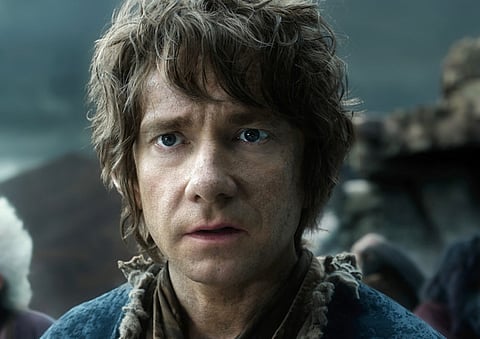Peter Jackson is saying goodbye with his final Hobbit film
The Battle of the Five Armies, which Jackson calls a thriller, is not a war film

Judging strictly from the title, it might seem safe to assume that The Hobbit: The Battle of the Five Armies, the concluding instalment in Peter Jackson’s latest trilogy of films based on the writing of J.R.R. Tolkien, would arrive as something of a war film, Middle-earth style.
But Jackson insists that the blockbuster fantasy, which opens in UAE theatres on December 11, is far more interested in charting the descent of proud dwarf Thorin Oakenshield (Richard Armitage) into a crippling madness than it is in conjuring images of battlefield brutality.
“It’s very much like a thriller. That’s the tone of it,” Jackson said. “I’m not letting that tone go for a second. It gives me a chance to feel like I’m making a different movie, not something that has the familiar elements that we’ve had in the past.”
Jackson, 53, has spent more than a decade bringing the faraway land to life on the screen with his Lord of the Rings films and the Hobbit movies, earning critical acclaim and an outsized cinematic reputation along the way.
The final Hobbit instalment, The Battle of the Five Armies, represents the culmination of a life’s work in a certain way.
The story, based on Tolkien’s landmark 1937 youth novel, picks up where last year’s The Hobbit: The Desolation of Smaug ends, with dwarf king Thorin (Armitage) and company, accompanied by Martin Freeman’s good-natured hobbit, Bilbo Baggins, having reclaimed the treasure of their lost homeland Erebor from the evil dragon (Benedict Cumberbatch).
A vengeful Smaug heads to Lake-town to decimate the nearby village of Men, setting into motion the conflict that will grow to include the armies of the title.
“I understood where we were going with these characters. We weren’t discovering it along the way. We started out doing a little bit of that in the beginning. We now knew who everyone was and what they represented and could really kind of crank it up. The making of it felt very different to me than the other ones.”
As they did with Smaug, Jackson and his writing partners Fran Walsh and Philippa Boyens again took liberties with the original story — in this case, giving the human character Bard the Bowman, played by Luke Evans, a more substantial role in the story.
“Bard is a blank page in terms of what he could be in a movie like this because Tolkien doesn’t really describe him too much in depth in the book of The Hobbit,” Jackson said. “We wanted to give Bard a deeper role than that ... He’s the counterpoint to Thorin, really.
“On one side of it you’ve got this dwarf descending into madness and on the other hand this human being who has to hold his people together and confront Thorin. He is the guy who has to try to manage what’s happening and carry all the humanity that Thorin has lost.”
Despite staging a monumental war among hostile tribes of creatures and guiding the story lines of dozens of characters to their conclusion, Jackson said he’s made an effort to keep the film from feeling ponderous or overly long.
“It’s very snappy, it’s got very short scenes, it whizzes along,” said Jackson, who already has begun writing scripts with Walsh for projects that have nothing to do with hobbits, orcs or goblins. “The other five Tolkien movies have all had journeys ... This movie, there ain’t no travelling. Everybody’s exactly where they need to be.



